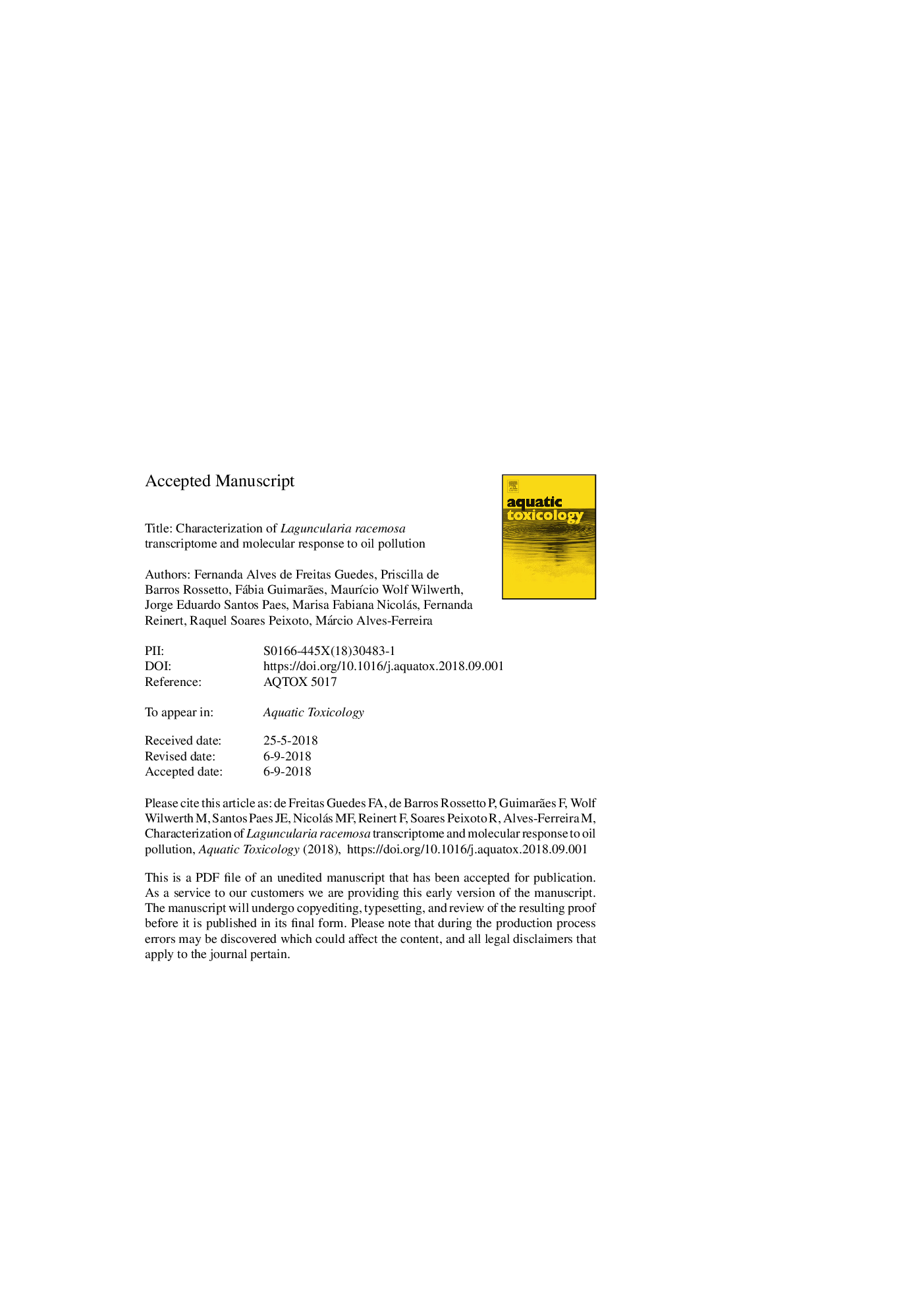| کد مقاله | کد نشریه | سال انتشار | مقاله انگلیسی | نسخه تمام متن |
|---|---|---|---|---|
| 11012970 | 1797854 | 2018 | 40 صفحه PDF | دانلود رایگان |
عنوان انگلیسی مقاله ISI
Characterization of Laguncularia racemosa transcriptome and molecular response to oil pollution
دانلود مقاله + سفارش ترجمه
دانلود مقاله ISI انگلیسی
رایگان برای ایرانیان
کلمات کلیدی
موضوعات مرتبط
علوم زیستی و بیوفناوری
علوم کشاورزی و بیولوژیک
علوم آبزیان
پیش نمایش صفحه اول مقاله

چکیده انگلیسی
Mangroves are ecosystems of economic and ecological importance. Laguncularia racemosa (Combretaceae), popularly known as white mangrove, is a species that greatly contributes to the community structure of neotropical and West African mangrove forests. Despite the significance of these ecosystems, they have been destroyed by oil spills that can cause yellowing of leaves, increased sensitivity to other stresses and death of trees. However, the molecular response of plants to oil stress is poorly known. In this work, Illumina reads were de novo assembled into 46,944 transcripts of L. racemosa roots and leaves, including putative isoform variants. In addition to improving the genomic information available for mangroves, the L. racemosa assembled transcriptome allowed us to identify reference genes to normalize quantitative real-time PCR (qPCR) expression data from oil-stressed mangrove plants, which were used in RNASeq validation. The analysis of expression changes induced by the oil exposure revealed 310 and 286 responsive transcripts of leaves and roots, respectively, mainly up-regulated. Enriched GO categories related to chloroplasts and photosynthesis were found among both leaf and root oil-responsive transcripts, while “response to heat” and “response to hypoxia” were exclusively enriched in leaves and roots, respectively. The comparison of L. racemosa 12-h-oil-stressed leaf expression profile to previous Arabidopsis heat-stress studies and co-expression evidence also pointed to similarities between the heat and oil responses, in which the HSP-coding genes seem to play a key role. A subset of the L. racemosa oil-responsive root genes exhibited similar up-regulation profiles to their Arabidopsis homologs involved in hypoxia responses, including the HRA1 and LBD41 TF-coding genes. Genes linked to the ethylene pathway such as those coding for ERF TFs were also modulated during the L. racemosa root response to oil stress. Taken together, these results show that oil contamination affects photosynthesis, protein metabolism, hypoxia response and the ethylene pathway in L. racemosa 12-h-oil-exposed leaves and roots.
ناشر
Database: Elsevier - ScienceDirect (ساینس دایرکت)
Journal: Aquatic Toxicology - Volume 205, December 2018, Pages 36-50
Journal: Aquatic Toxicology - Volume 205, December 2018, Pages 36-50
نویسندگان
Fernanda Alves de Freitas Guedes, Priscilla de Barros Rossetto, Fábia Guimarães, MaurÃcio Wolf Wilwerth, Jorge Eduardo Santos Paes, Marisa Fabiana Nicolás, Fernanda Reinert, Raquel Soares Peixoto, Márcio Alves-Ferreira,